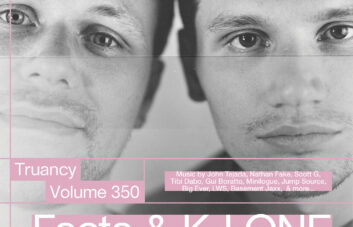Throughout his four albums released on Miasmah under the moniker Kreng, Pepijn Caudron’s music has played on the tension between intense, ominous drone and more “light” – even pretty, modern classical motifs. When delicate bell tones occasionally break through the murk of sombre violin strings and mournful piano, the affective impact of one is made more powerful by the other. This sort of work with contrast is not uncommon, but Kreng has become arguably one of its best exponents in the contemporary field of experimental and modern classical music. Those contrasts are still present in “The Summoner”, but what sets it apart is a departure from more cinematic or theatrical drama towards a far more personal perspective, and it’s more single-minded quality.
Caudron has enjoyed a long and critically successful relationship with film and theatre. A number of his soundtrack pieces were released by the label Miasmah as L’Autopsie Phénoménale de Dieu. The follow-up, Grimoire (which also found home on Miasmah), was written as a standalone work but retained many of the distinctive qualities of the “L’Autopsie…” – listen to any of the immersive pieces from the two and it is easy to imagine them as accompanying a tense scene from a cult horror film. By comparison, The Summoner was borne out of deep personal loss of three friends, with the narrative of the album using the 5 stage Kübler-Ross model of the grieving process as principal foundation.
On the opener “Denial”, what sounds like the gentle rustle of leaves is accompanied by a ghostly hum, a hollow clattering and a distant rumbling drone. The sombre atmosphere is pierced by sharp, crescendoing strings which disappear as suddenly as they appear only to return with an even greater intensity, like pangs of sorrow and realisation breaking through the fog of emotions giving name to the piece. The blunt naming of each piece may initially give an impression that the music reductive and flattening out complex emotions, but that is not the case. “Anger” is not a uniformly loud, aggressive composition, but one that provides a sonic depiction of rising sense of unrest that one may go through. The overall tone is different to the previous track, with a sense of lament replaced by a more oppressive, uniform one which gradually peaks in a series of grinding, harsh strings which are then subsumed in a bed of of nervous bleeps and rolling, thunderous drums.
And so on and so forth – Kreng guides us through a series of compositions, the basic palette of processed strings, drones and field recordings remaining the same but the nuances in the deployment of said elements providing a thematic and emotional depth and deeply evocative quality. The apex of the album is “The Summoning”, a collaboration between Caudron and his compatriots and doom metal group Amenra which serves as the artists interjection into the traditional narrative of grief. In an excellent, in-depth interview he describes it as “an imaginary last talk with my loved lost ones…a chance…to share a moment while knowing it is the last time you see each other”. In longest piece of the album, in an expression of deep catharsis loud guitar riffs and drums dramatically crash into the preceding contemplative mix of piano, distant rumbling percussion and drone.
As is often the case with art that successfully deals with macabre or nominally “dark” themes, Kreng’s previous works, despite their overarching atmosphere of doom and gloom, also contained glimmers of a (perhaps somewhat wry, but nevertheless) humorous nature. Appropriately when one considers the topic being explored, there is no wry smile peeking from behind the curtain here. Instead, the album closes with the lightness of “Acceptance”, in which the tense, haunting mood of the previous 5 pieces is succeeded by a quiet, gentle melancholia.
It seems very difficult – and perhaps even unnecessary, to generalise the feelings that one may go through when dealing with such traumatic personal events and further to project them onto others. However, speaking from personal experience, what makes this album compelling is that Kreng manages to capture with his compositions – in particular with the use of silence and build-up, the non-linear, non-structured form that emotions can take and make this into a highly affecting and relatable record.
Kreng’s Grimoire is available on vinyl, CD and digital from Miasmah




